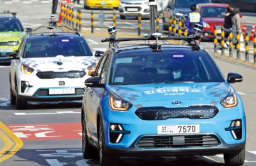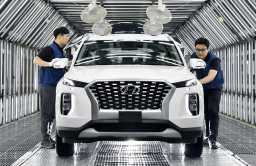-
KOSPI 2812.05 +41.21 +1.49%
-
KOSDAQ 756.23 +6.02 +0.80%
-
KOSPI200 376.54 +6.64 +1.80%
-
USD/KRW 1373 3.00 -0.22%
Hyundai Motor shares set to rebound after hitting trough
Korean stock market
Hyundai Motor shares set to rebound after hitting trough
The stock has reflected issues like inflation woes, chip shortages and the Russia-Ukraine war; now its valuation is attractive
By
Mar 31, 2022 (Gmt+09:00)
3
Min read
News+

South Korean top automaker Hyundai Motor Co.'s shares are poised for a rebound. On March 30, the stock rose by 2.55% to 181,000 won ($149.46), 11.73% up from a 52-week low of 162,000 won ($133.77) on March 15.
Foreigners led the comeback, buying a net 31 billion won worth of shares during the 10 trading days until March 29. On the other hand, individuals and institutions sold a net of 25.7 billion won and 3 billion won in stock, respectively, during the same period. Foreign investors dumped more than 300 billion won worth of the carmaker's shares between March 2 and 15.
Hyundai Motor's share has declined since the second half of 2021 due to concerns over inflation, chip shortage, interest rate hikes and the Russia-Ukraine war. The stock price hit a 52-week high of 249,000 won on June 24, 2021, and plunged by 35% to 162,000 won on March 15.
The stock seems to have reflected the market sentiment and is set to bounce back. The concerns have been eased in line with the oil price drop and expectations of Russia-Ukraine peace talks. Also, weakening Korean won is expected to be favorable for the automaker’s short-term performance.
The chip shortage issue has no sign to be addressed yet although industry watchers forecast the shortage will slightly ease in the second half of this year. The low-supply issue will last throughout 2022, some industry watchers say. However, the watchers expect the chip shortage problem has been reflected in the auto stocks and won’t further deteriorate.
The market expectation of Hyundai Motor’s performance and attractive valuation are boosting the stock price. The automaker has improved its pricing strategy by raising the finished car prices and increasing sales of luxury car models, in response to the supply chain issue.
“The increase in Hyundai Motor’s average selling price (ASP) will support its performance in the first half of 2022. Also, an additional decline from the current stock price level will be limited,” said Chang Moon-su, an analyst at Hyundai Motor Securities Co.
The valuation has become attractive, with 7.5 times of 12-month forward price-to-earnings ratio. The forward P/E ratio has been normally around 8 to 10 times, hitting 10 to 11 times a year ago with low-interest rates.
EV, SMART FACTORY, ROBOTS FOR FUTURE GROWTH
The potential of Hyundai Motor stock depends on its mid-to-long-term growth. The automaker’s plan for future mobility businesses hasn’t been attractive to investors, market watchers say. Foreign investors hold only a 26% stake, a similar level to that during the 2009 global financial crisis.
Hyundai Motor is accelerating its transformation to electric vehicles through building more than 17 EV lineups by 2030. It also plans to beef up profitability by introducing smart factories, the manufacturing platforms run by an automated system based on digital data and information technology. Hyundai Motor targets 8% annual operating profit by 2025 and 10% by 2030. “The automaker’s mid-to-long-term growth plan is desirable, but it needs to set up more concrete plans,” said Kim Dong-ha, an analyst at Hanwha Investment & Securities Co.
The automaker is developing robots as another future growth engine. Hyundai Motor is the first finished car maker that has commercialized industrial wearable robots, CEX (chairless exoskeleton) which gives knee support to sedentary assembly workers and VEX (vest exoskeleton), a follow-up exoskeleton designed for neck and shoulder support. The parent group Hyundai Motor Group received the government's temporary operation permits for its 193 self-driving taxis last month. Other types of robots are also under development, such as EV-charging robots and customer service robots.
Write to Yun-Sang Ko at kys@hankyung.com
Jihyun Kim edited this article.
More To Read
-
Mar 17, 2022 (Gmt+09:00)
-
Feb 25, 2022 (Gmt+09:00)
-
 The Deep DiveHow Carlyle aligned interests with Hyundai Motor chair
The Deep DiveHow Carlyle aligned interests with Hyundai Motor chairFeb 13, 2022 (Gmt+09:00)
-
Feb 09, 2022 (Gmt+09:00)
-
Jan 25, 2022 (Gmt+09:00)






